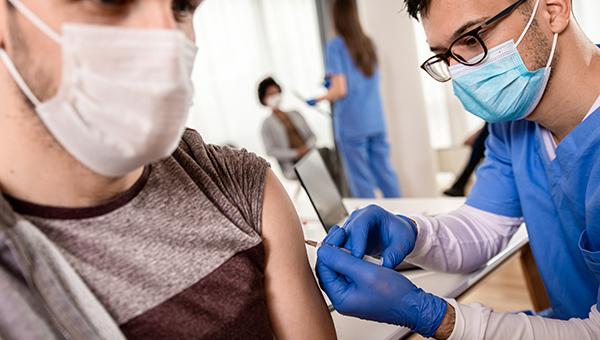New Insights Into Myocarditis and mRNA COVID-19 Vaccines
Myocarditis, typically mild, was significantly more common with Moderna vaccines than in the unvaxxed, population data show.

The risk of myocarditis or myopericarditis appears to be about three- to fourfold higher for those who receive the Moderna COVID-19 vaccine compared with unvaccinated individuals, while the one manufactured by Pfizer is linked to greater risk only for females, according to new Danish population data. But the absolute rate of developing these complications is low, even for younger patients, and the clinical consequences were, for the vast majority, mild.
Prior data from Israel and elsewhere have shown a link between the mRNA vaccines and acute myocarditis, though a large series published last week confirmed that these patients generally fare well. Additionally, another study published this week in Nature Medicine confirmed early studies showing that the risk of myocarditis after a SARS-CoV-2 infection is much higher than after receipt of a COVID-19 vaccine.
“Taken together with the potential long-term sequelae of even mild SARS-CoV-2 infection, and with the risk of multisystem inflammatory syndrome among adolescents (which is associated with severe morbidity), our finding . . . supports the overall benefits of such vaccination on an individual, societal, and global level,” write lead author Anders Husby, MD, PhD (Statens Serum Institut, Copenhagen, Denmark), and colleagues.
To TCTMD, senior author Anders Hviid, DMSc (Statens Serum Institut), said the findings “confirm the patterns seen in other countries” published over the last few weeks. “But I guess one of the surprising things that we saw in our study was that it also looked like the females were also affected,” he added, noting that the emphasis has seemed to be on males and younger individuals in past analyses. “But it has to be said that myocarditis is rare and even rarer in women.”
The findings are altogether reassuring, Hviid observed. “The bottom line is myocarditis is rare and it's also rare after vaccination,” he said. “It looks to be predominantly mild, especially among the younger people, [compared] to the risk associated with infection.”
Rare Overall
For the study, published online today in the BMJ, the researchers followed all residents of Denmark 12 years or older from October 2020, excluding those who had been previously diagnosed with myocarditis or pericarditis within 3 years. Specifically, they looked at almost 5 million individuals, including 3,482,295 and 498,814 vaccinated with the Pfizer and Moderna shots, respectively (more than 96% received two doses), and just shy of 1 million unvaccinated.
Over 1-year follow-up, the primary endpoint of myocarditis or myopericarditis—the composite of a hospital diagnosis of myocarditis or pericarditis, increased troponin levels, and a hospital stay lasting more than 24 hours—was reported in 269 patients regardless of vaccination status (40% of whom were between the ages of 12 and 39 years old, while 73% were male).
Among those who received the Pfizer vaccine, there was a nonsignificant increase in myocarditis or myopericarditis within 28 days compared with unvaccinated individuals. This increase remained nonsignificant for those aged 12-39 years, and notably it was significantly higher for females but not males.
The Moderna vaccine was associated with an overall higher rate of myocarditis or myopericarditis within 28 days compared with being unvaccinated, and this was driven by an increase in events among those aged 12-39 years and seen in both men and women.
However, absolute rates of myocarditis or myopericarditis were low across the board.
Myocarditis or Myopericarditis Within 28 Days
|
|
Adjusted HR vs Unvaccinated |
95% CI |
Absolute Rate per 100,000 Vaccinated |
|
Pfizer |
1.34 |
0.90-2.00 |
1.4 |
|
12-39 Years Old |
1.48 |
0.74-2.98 |
1.6 |
|
Females |
3.73 |
1.82-7.65 |
1.3 |
|
Males |
0.82 |
0.50-1.34 |
1.5 |
|
Moderna |
3.92 |
2.30-6.68 |
4.2 |
|
12-39 Years Old |
5.24 |
2.47-11.12 |
5.7 |
|
Females |
6.33 |
2.11-18.96 |
2.0 |
|
Males |
3.22 |
1.75-5.93 |
6.3 |
Also, compared no vaccination, both the Pfizer (adjusted HR 0.51; 95% CI 0.49-0.53) and Moderna vaccines (adjusted HR 0.41; 95% CI 0.37-0.46) were linked to substantial reductions in the likelihood of cardiac arrest or death.
In sensitivity analyses looking at first and second doses of both vaccines, only the second dose of Moderna’s was significantly associated with myocarditis or myopericarditis.
Lastly, clinical outcomes of the patients with myocarditis or myopericarditis were for the most part mild. Among the 155 unvaccinated, about 48% remained in the hospital 72 hours after being admitted for the condition, 4.5% had heart failure within 28 days, and 1.9% died within 28 days. Among the 48 who received the Pfizer vaccine, rates were 58.3%, 2.1%, and 2.1%, respectively. With the 21 Moderna-vaccinated patients, 40% were in the hospital at 72 hours but none developed heart failure or died.
While it’s “plausible” that the Moderna vaccine would be more likely to cause myocarditis than the Pfizer vaccine due to the higher concentration of mRNA, Hviid said the same argument could be applied to say the former would elicit a stronger immune response. “It might be that it's actually better, it's more effective that way,” he suggested, adding that he doesn’t think that these data are enough to support vaccination with one brand over another but do support vaccination overall.
One of the strengths of this study was how the researchers define myocarditis above and beyond an unconfirmed diagnosis, according to Hviid. “We don't just use diagnosis. We also have a nationwide laboratory register, so we also use troponin tests,” he said. “So we are certain that it is myocarditis and it's not just somebody who's received the diagnosis for a condition that looks like it but really isn't.” This has been hinted at in other studies, though it’s “reassuring that you can replicate these findings across countries and using different data and different statistical methods,” Hviid added.
The big open question now relates to how booster shots will affect myocarditis outcomes. “There might be some concern of a myocarditis risk with the third dose,” he said, adding that his team will be studying this using “almost real-time” data when it becomes available. Hviid and colleagues also plan to study myocarditis rates in children younger than 12, but he suspects this will be “less of an issue” as the background risk is lower in this setting.
Yael L. Maxwell is Senior Medical Journalist for TCTMD and Section Editor of TCTMD's Fellows Forum. She served as the inaugural…
Read Full BioSources
Husby A, Hansen JV, Fosbøl E, et al. SARS-CoV-2 vaccination and myocarditis or myopericarditis: population based cohort study. BMJ. 2021;Epub ahead of print.
Disclosures
- Husby reports being supported by a grant from the Lundbeck Foundation.
- Hviid reports no relevant conflicts of interest.





Comments